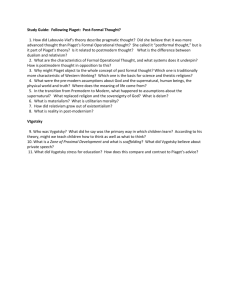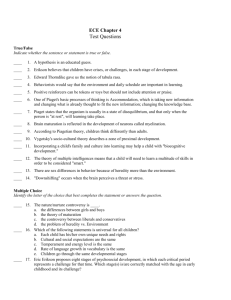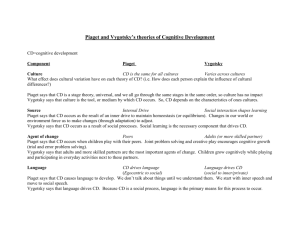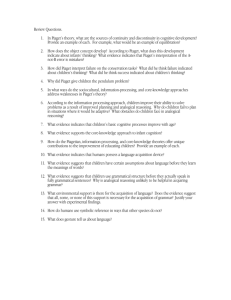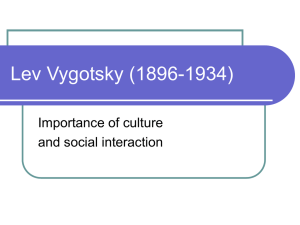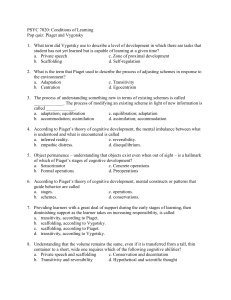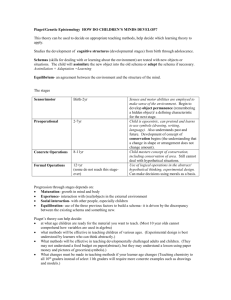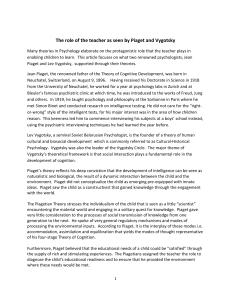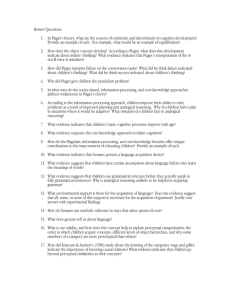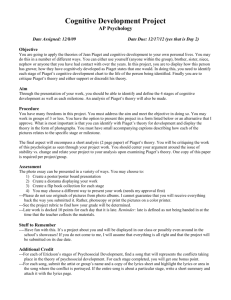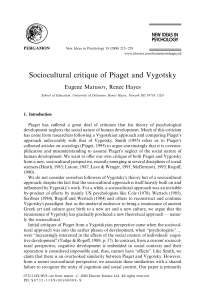Review for Examination I
advertisement
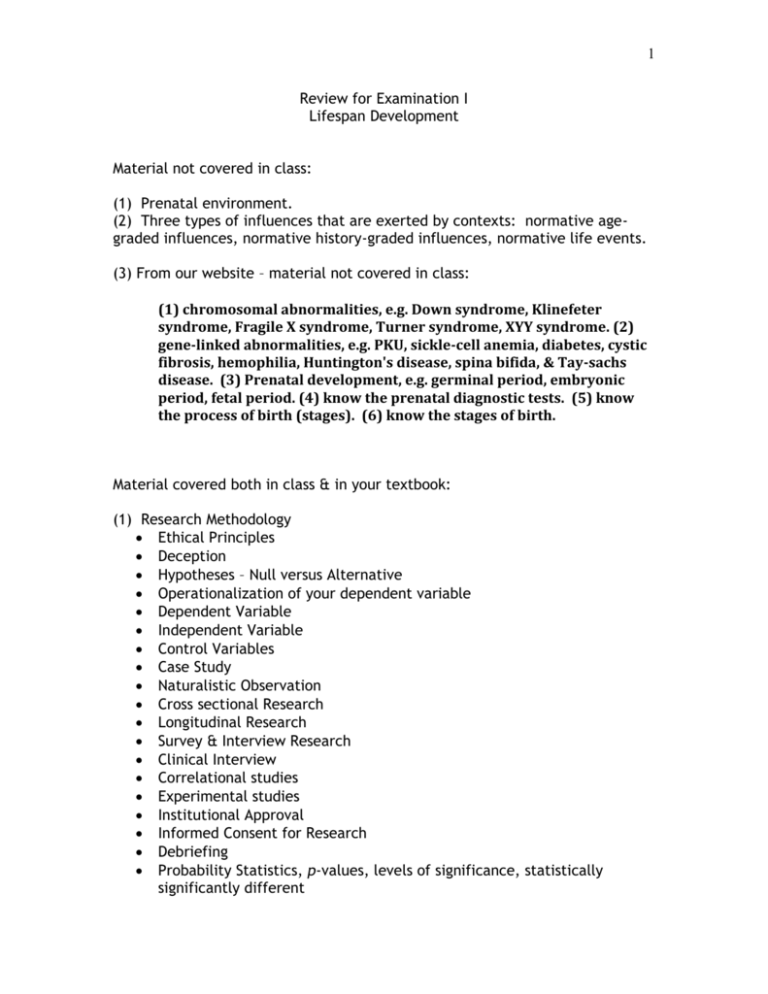
1 Review for Examination I Lifespan Development Material not covered in class: (1) Prenatal environment. (2) Three types of influences that are exerted by contexts: normative agegraded influences, normative history-graded influences, normative life events. (3) From our website – material not covered in class: (1) chromosomal abnormalities, e.g. Down syndrome, Klinefeter syndrome, Fragile X syndrome, Turner syndrome, XYY syndrome. (2) gene-linked abnormalities, e.g. PKU, sickle-cell anemia, diabetes, cystic fibrosis, hemophilia, Huntington's disease, spina bifida, & Tay-sachs disease. (3) Prenatal development, e.g. germinal period, embryonic period, fetal period. (4) know the prenatal diagnostic tests. (5) know the process of birth (stages). (6) know the stages of birth. Material covered both in class & in your textbook: (1) Research Methodology Ethical Principles Deception Hypotheses – Null versus Alternative Operationalization of your dependent variable Dependent Variable Independent Variable Control Variables Case Study Naturalistic Observation Cross sectional Research Longitudinal Research Survey & Interview Research Clinical Interview Correlational studies Experimental studies Institutional Approval Informed Consent for Research Debriefing Probability Statistics, p-values, levels of significance, statistically significantly different 2 (2) Life Expectancy, Aging, & Centenarian Research Definition of Life span What is the maximum we can live (theoretically)? Sex differences in longevity Psychological predictors of longevity – Terman & Termite study, Freidman et al (1995). Duke Longitudinal Study The Nun Study Theories of Aging: Cellular Clock Theory, Free Radical Theory, Mitochondrial Theory, Hormonal Stress Theory (3) Nature versus Nurture What are examples of nature & nurture? What does the research say about the relative genetic or environmental interplay for intelligence? Personality or temperament? Psychiatric disorders (make sure that you know the diathesis stress model). Can we improve intelligence? Examples…Mentally retarded & autism. What are the family methods for studying psychiatric disorders – understand adoption & twin studies, Monozygotic versus dizygotic twin studies, shared versus nonshared environment, concordance rates. Teratogens & their specific effects. (4) Prenatal Environment Cephalocadual development Proximal-distal development Principle of hierarchical Integration Principle of the independence of systems Evolutionary psychology Procedures to detect birth defects: Chorionic villus sampling, maternal blood tests, ultrasound, umbilical cord blood sampling. Preimplantation genetics Understand how conditions in the womb can lead to problems with diabetes, cancer, cardiovascular disease, etc. Specifically, understand about the role of cortisol & stress, undernutrition (5) Brain Plasticity What is brain or neural plasticity? Is IQ fixed at birth? What is the evidence for your answer? Know the story of Brandi Binder. Understand the hemispheric specialization for the left and right hemispheres. What happens to baby’s brains when they are physically abuse? Emotional deprivation? Their mom has a serious depression? What are critical or sensitive periods of development? 3 What are the critical or sensitive periods for the development of eyesight, hearing, development of an accent, and the development of language. Know the Genie story & the relationship of a deprived environment, critical periods of development, & language. When does brain plasticity increase? When does it decrease? (6) Jean Piaget & Cognitive Development What was Piaget’s views on education? What is Piaget’s view of human intelligence? How is knowledge constructed? Why does Piaget feel that knowledge is biased? How did Piaget relate cognitive development to biology? What is mental embryology? What does structuralism mean? Piaget proposed his views via a stage theory. What are the tenets of a stage theory? What is the semi-clinical interview? What are the potential problems with this approach? Be able to talk about the Day care scandal in the 80s & problems with repressed memories when seeing a Psychologist. Make sure that you understand all of the vocabulary associated with Piaget, e.g. qualitative & quantitative changes, equilibrium, disequilibrium, adaptation, assimilation, accommodation, egocentrism, schemas, semiotic function, rigidity of thought, lack of reversibility, semilogical reasoning, limited social cognition. What guided development? Make sure that you understand emotions, maturation, experience, & social interation. Know the stages of Piaget’s theory. What are the strengths & weaknesses of Piaget’s theory. (7) Vygotsky What is Vygotsky’s view of mental and behavioral development? What is Vygotsky’s view of private speech? What did Vygotsky think about the instructor in a learning environment?
